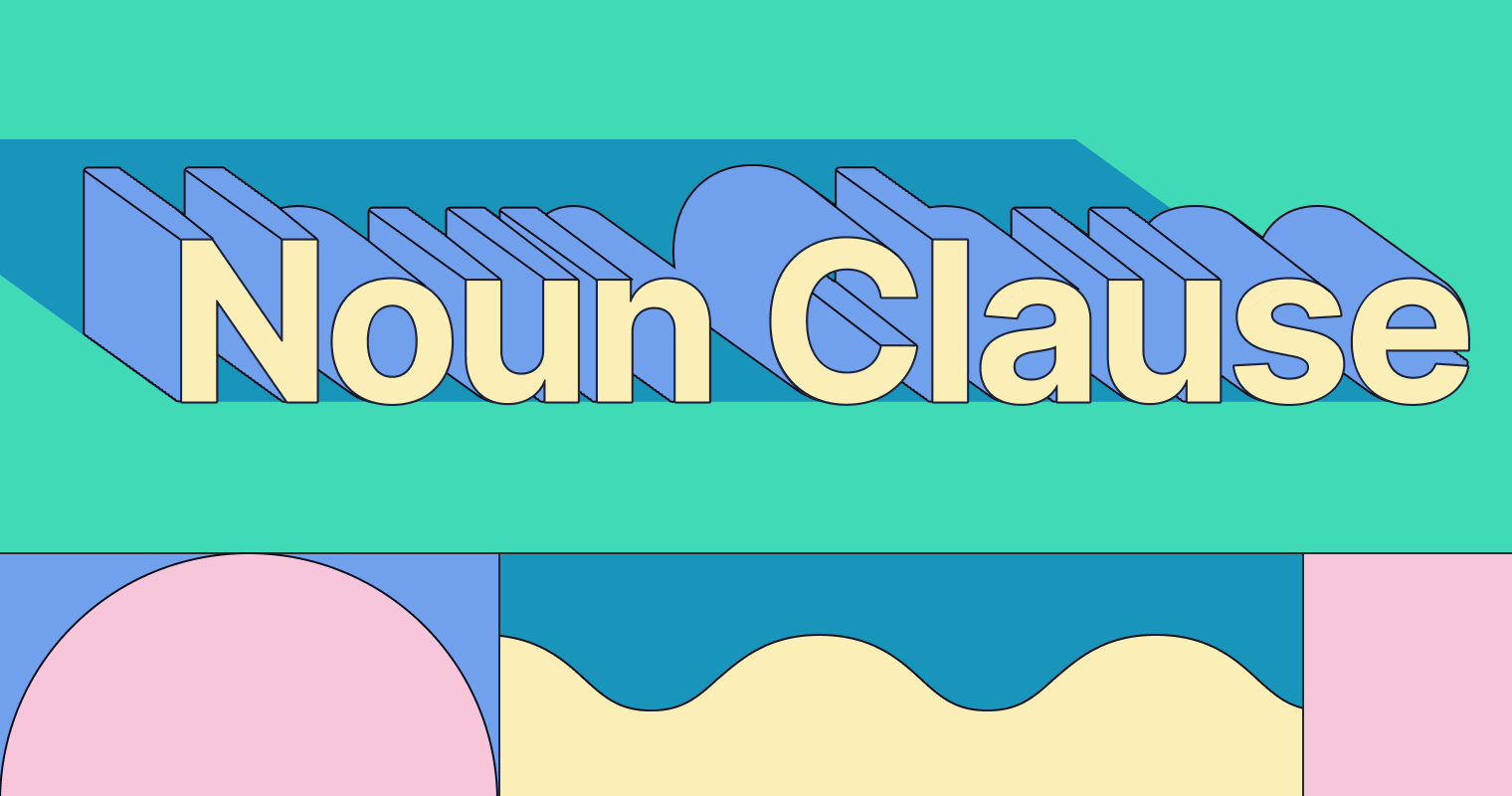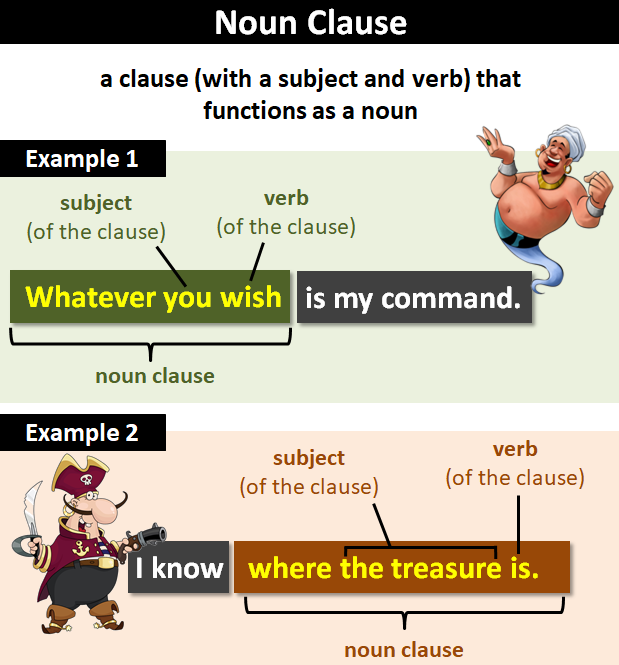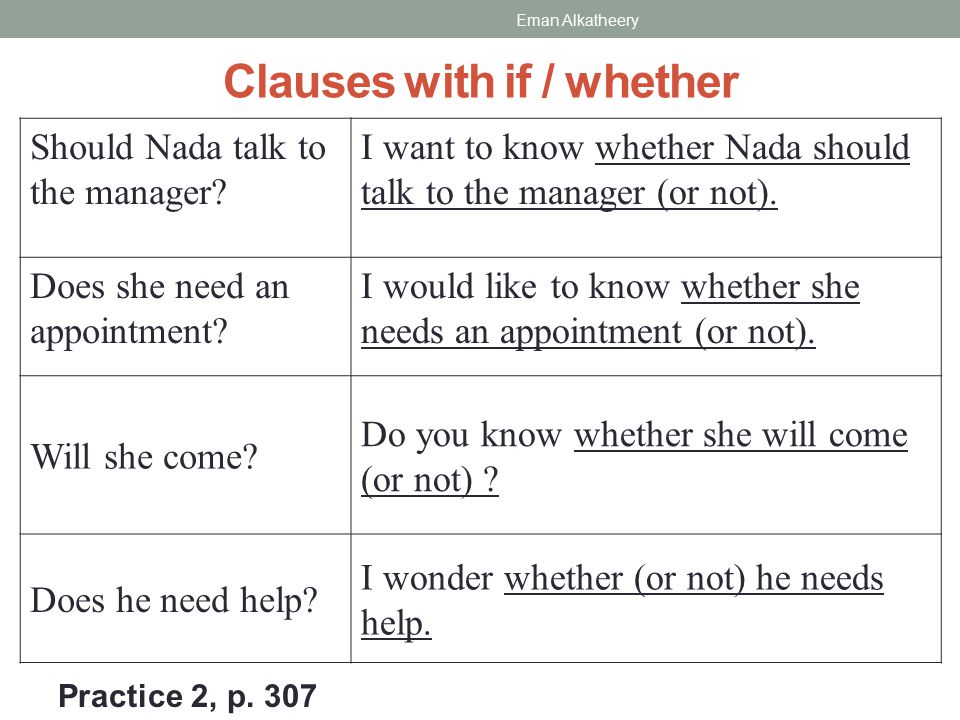Noun Clauses.
A clause is a group of words containing a subject and a verb.
An independent clause (or main clause) is a complete sentence. It contains the main subject and verb of a sentence.
Example: a) Sue lives in Tokyo. b) Where does Sue live? Both sentences are complete sentences, the difference (a) is a statement (b) is a question.
A dependent clause (or subordinating conjunction) is not a complete sentence. It must be connected to an independent clause.
For example, Where does Sue live?
In the following example, I know where Sue lives. It has an independent clause with the main subject (I) and verb (know) of the sentence.
Where Sue lives is a dependent clause connected to an independent clause. Where Sue lives is called a noun clause.
A noun phrase is used as a subject or an object.
A noun clause is used as a subject or an object. In other words, a noun clause is used in the same ways as a noun phase.
In the example, his story was interesting.
His story is a noun phrase. It is used as the subject of the sentence.
What he said was interesting. What he said is a noun clause. It is used as the subject of the sentence. The noun clause has its own subject (he) and verb (said).
In the example, I heard his story.
His story is a noun phrase. It is used as the object of the verb heard.
In the example, I heard what he said.
What he said is a noun clause. It is used as the object of the verb head.
In, I listened to his history.
His story is a noun phrase. it is used as the object of the preposition to.
In, I listened to what he said.
What he said is a noun clause. It is used as the object of the preposition to.
Clauses that begin with Wh words.

There are many clauses that begin with a question word such as.
Where does she live? = (a) I don't know where she lives.
What did he say? = (b) I couldn't hear what he said.
When do they arrive? = (c) Do you know when they arrive?
In (a) where she lives is the Object of the verb know. In a noun clause, the subject precedes the verb. Do not use question words order in a noun clause.
NOTICE: DO, DID, and DO are used in questions, but not in noun clauses.
Who lives there? = (d) I don't know who lives there.
What happened? = (e) Please tell me what happened.
Who is at the door? = (f) I wonder who is at the door.
In (d): the word order is the same in both the question and the noun clause because who is the subject in both.
Who is she? = (g) I don't know who she is.
Who are those men? = (h) I don't know who those men are.
Whose house is that? = (i) I wonder whose house that is.
in (g): she is the subject of the questions, so it is placed in front of the verb be in the noun clause.
who is at the door? = Who is the subject of the question.
Who are those men? = Those men is the subject of the question, so be is the plural
What did she say? = (j) What she said surprised me.
What should they do? = (k) What they should do is obvious.
in (k): What she said is the subject of the sentence. Notice in (k): A noun clause subject takes a singular verb. (e.g.; is)
Whether/if at the beginning of a noun clause.
When a yes/no question is changed to a noun clause, whether or if is used to introduce the clause.
will she come?
I don't know whether she will come.
I don't know if she will come.
Does he need help?
I wonder whether he needs help.
I wonder if he needs help.
NOTE: Whether is more acceptable in formal English, but if is quite commonly used, especially in speaking.
In the following three sentences notice the patterns when or not is used.
I wonder whether or not she will come.
I wonder whether she will come or not.
I wonder if she will come or not.
In the following sentence notice that the noun clause is in the subject position.
Whether she comes or not is unimportant to me.Use of That
As we learned before about clauses that begin with Wh words, there are also clauses that begin with THAT which function as an adjective.
In sentences such as He is a good actor or The world is round. If we join the independent clauses to a dependent one such as.
(a) I think that he is a good actor.
(b) I think he is a good actor.
(c) We know (that) the world is round.
In (a) that is a good actor is a noun clause. It is used as the object of the verb think.
NOTE: The word that, when it introduces a noun clause has no meaning in itself. It simply marks the beginning of the clause. Frequently it is omitted, as in (b), especially in speaking (if used in speaking, it is unstressed.
She doesn't understand spoken English.
(d) That she doesn't understand spoken English is obvious.
(e) It is obvious (that) she doesn't understand spoken English.
The world is round.
(f) That the world is round is a fact.
(g) It is a fact that the world is round.
In (d) The noun clause ( That she doesn't understand spoken English.) is the subject of the sentence. The word that is not omitted when it introduces a noun clause used as the subject of the sentence, as in (d) and (f).
More commonly, the word it functions as the subject and the noun clauses is placed at the end of the sentence, as in (e) and (g).
Correct Use of Noun Clauses.
Noun clauses can be placed in many different places in the sentence. A noun and a noun clause both have the same function in the sentence, being a noun, as a person, animal, or thing. Noun clauses can be a subject, subject complement, direct object, indirect object, and prepositional complement.
This time we will be focused on only two functions. Noun clause as subject and noun clause as direct object.
"That clause" as Direct Object.
A noun clause can function as a direct object of the verb in the sentences. A direct object is a word, phrase, or clause that follows and receives the action of a transitive verb in the sentence (the independent clause). A direct object in a sentence answer to the question "What?" or "Whom?"
example.
The students eat cake.
Ask yourself, “What did the students eat?” The answer is the direct object, which in this case is “cake.”
Some Example of noun clauses functions as a direct object.
The child admitted that he stole the cookie.
Scientists believe that man is more than a mere organism.
That clause as a Subject.
A subject is the phrase, word, or phrase that performs the action or acts upon the verb. A noun clause can perform the same function when it appears at the beginning of the sentence.
That-clauses as Subjects
Using that-clauses as subjects is somewhat uncommon in English because English speakers tend to place the verb early in the sentence, and long subjects like that-clauses are usually placed at the end or replaced with the dummy pronoun "it".
That you still live with your parents is perhaps not surprising.
Or we can say:
It is perhaps not surprising that you still live with your parents.
In this case, we cannot omit 'that', because 'that' marks the clause as subordinate and prevents the listener from interpreting it as the main clause.
That he's only 17 was shocking to me. (Not 'that he's only 17 was shocking to me.')
Verbs Allowing That-clause as Subjects
Verbs that allow a that-clause as subjects include:
Descriptive verbs: be + expressive adjectives, such as, clear, alarming, disgusting, etc.
Expressive Verbs: amaze, amuse, anger, disgust, disturb, etc.
Take a look at some examples:
That Tolkien was a literary genius is clear to us.
That he got away with it disgusts me.
Examples of noun clauses as subjects:
That she worked hard for the whole term pleased her parents.




Comments
Post a Comment